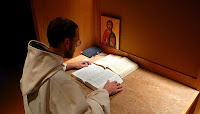 On Friday we heard the parable of the sower/soils, at least the latter or "analogy portion" of the parable where Jesus explains the story's meaning. We all know it well; seed is sown broadcast-style over a wide swath of ground. Some falls on the path, some on rocky ground, some of thorny ground, and some on rich ground. Jesus makes analogies of the act of broadcasting seed on each of these types of ground. When seed falls on the path it represents the hearer of the Word who is without understanding and the Word sown in his/her heart is stolen away by "the Evil One"; when seed falls on rocky ground it represents the person who receives the Word with joy and grace, but who is "without root" (or fails to allow the Word to take root within her) and falls away from life in and from the Word. When seed falls on thorny ground we are given a picture of the person who hears the Word, allows it to take root, but then allows anxiety and a yearning for other forms of riches to choke the life of the word out; and finally Jesus portrays the person in whom the Word takes root and bears an enormously rich harvest, 30, 60, 100 fold.
On Friday we heard the parable of the sower/soils, at least the latter or "analogy portion" of the parable where Jesus explains the story's meaning. We all know it well; seed is sown broadcast-style over a wide swath of ground. Some falls on the path, some on rocky ground, some of thorny ground, and some on rich ground. Jesus makes analogies of the act of broadcasting seed on each of these types of ground. When seed falls on the path it represents the hearer of the Word who is without understanding and the Word sown in his/her heart is stolen away by "the Evil One"; when seed falls on rocky ground it represents the person who receives the Word with joy and grace, but who is "without root" (or fails to allow the Word to take root within her) and falls away from life in and from the Word. When seed falls on thorny ground we are given a picture of the person who hears the Word, allows it to take root, but then allows anxiety and a yearning for other forms of riches to choke the life of the word out; and finally Jesus portrays the person in whom the Word takes root and bears an enormously rich harvest, 30, 60, 100 fold.
Several images came to mind when reflecting on this reading. For instance, I remembered a time several years ago my pastor asked the adults present in a weekday Mass to name their favorite Scripture story or share their favorite Scripture verse with students from our school who were attending Mass with us that day. Many of us quoted a verse that was personally significant. One after the other, verse after verse, people revealed themselves as "hearers of the Word" and alluded to the deep story of their own lives in relationship with God in Christ which was, to some extent, captured or mirrored in the verse they shared. Religious do this with the motto they choose for their rings, for instance. My own is, "God's power is perfected in weakness." It is the short version of Paul's, "My grace is sufficient for you; my power is perfected in weakness." Almost every moment or mood of my life as well as every dream and goal which shape my life and vocation is captured in this verse from 2 Corinthians.
My director/delegate recounts two Scriptures which have served similarly in her own life. At profession she heard, "I have raised you up to show my power through you"; when she began a retreat ministry which allowed her to practice PRH, a methodical approach to personal healing and growth, the first liturgy at the retreat center used a passage from Deuteronomy 31. Sister Marietta found herself personally addressed in the line where Moses commissions Joshua: "You must put them in possession of their heritage." In this context heritage meant that deep Self, that sacred well of potentiality which is both the eternal gift of God and our own truest reality. It is the Word of God spoken within us, the sacred "name" God calls us to embody as no one else can or will. Throughout our lives, whether through choices we make or circumstances that befall us, our ability to attend to, embrace, and embody this heritage can be wounded and crippled. As a result our hearts will contain tamped down pathways, rocky and thorn-choked ground as well as deep layers of rich soil. But the injury done over the years can also be healed and some forms of pastoral ministry and the work associated with it as well as prayer, lectio divina, etc can greatly assist in this. Through these we can become the truly free persons we are called to be, unique articulations of the Word of God.
As I reflected on the parable this last week and thought on what it would mean to become the rich soil in which the Word of God comes to fruition I remembered the last scene from Ray Bradbury's short novel, Fahrenheit 451. In this dystopia where lives are empty and suicide is common, books are forbidden. Firemen no longer put out house fires; they locate houses in which owners have hidden books and douse them with kerosene, books and all, and set them ablaze. Sometimes they burn the owners as well. Montag, a fireman, steals some books and fails to turn them in. One of these is a Bible. Eventually Montag himself becomes the target of the government and the fire department comes to burn his house and the books hidden there; Montag is to be killed by lethal injection. But he escapes and runs to the forests outside the city. There he meets communities of human beings who have also escaped the empty, fruitless lives so common in that time.






















































